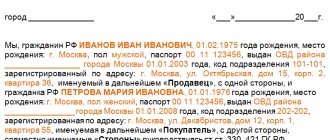In this article we will look at the tax deduction when exchanging an apartment. Let's learn about the registration procedure. We will sort out the necessary documents.
When carrying out a housing exchange transaction, as well as when concluding a purchase and sale agreement, the buyer and seller have tax obligations. The exchange agreement is also the basis for obtaining a property deduction for each of the parties to the agreement. Today we will talk about the specifics of filing a deduction under an exchange agreement, and also provide answers to common questions on the topic.
Tax obligations when exchanging housing
Under the provisions of the Tax Code, the party that exchanged real estate on the basis of an exchange agreement is required to pay personal income tax only if the exchange was made with an additional payment. The grounds for taxation are as follows: the amount of funds in the form of an additional payment is recognized as income on which tax must be paid, that is, the taxpayer is recognized as the person whose apartment was valued at a lower value upon exchange.
If the parties exchanged apartments of equal value, then there is no need to pay tax. The same rule applies to any real estate that, within the framework of the contract, was recognized as equal in price. That is, half a house can be exchanged for an apartment, a room for a country house, etc. If the agreement does not stipulate the fact of additional payment, then the parties do not have obligations to pay tax.
What do government representatives think about the barter agreement?
The simplest opinion for the people was the motivation of the Russian Ministry of Finance. It was reflected in some legislative acts. According to this opinion, an exchange agreement is the same as a purchase and sale agreement, where each party is a seller and a buyer. When real estate has been owned by a person for more than three years, it is not subject to tax upon sale.
Representatives of the tax service see the whole situation in their own way. Based on their opinion, it becomes clear that when exchanging an apartment, a person does not spend his own funds, except in cases where an additional payment needs to be made. Therefore, the tax should be calculated only on the amount of payment made, and the right to a tax deduction should not apply to the exchange agreement.
Judicial practice shows that sometimes people go to court with controversial issues regarding taxation under an exchange agreement.
Especially for such cases, it is established that a person can receive income:
- in monetary terms;
- in material form;
- in kind.
In the first two cases, no problems arise, but when it comes to income in kind, sometimes misunderstandings occur. Especially for this, the judges clarified that if one apartment under an exchange agreement is completely equal in value to another apartment, then such a transaction should not be burdened with tax.
Popular materials:
- Renting an apartment to a legal entity
Photo source A corporate tenant is the best client for any rentier. But renting out an apartment to a company is not... - How not to pay transport tax: a selection of legal methods Today you can use one of the legal grounds and not pay taxes on your car. How to avoid…
- Do I have to pay to call the Gorgaz emergency service? Greetings, Natalya! This issue is regulated by Decree of the Government of the Russian Federation dated May 14, 2013 N 410 “On measures...
Exchange of an apartment with an additional payment: is it possible to get a deduction?
What is the situation with barter contracts, the provisions of which provide for additional payment? The person who received the additional payment is burdened with tax obligations. But at the same time, each of the parties to such an agreement acquires the right to receive a property deduction, which means that the amount of tax can be reduced, and in certain situations, its payment can be avoided altogether.
Let's start with the person who is initially exempt from paying the tax. A citizen who, as a result of an exchange agreement, became the owner of more expensive housing (that is, the one who made the additional payment) in this case does not acquire tax obligations, but can receive a refund of the amount by filing a deduction. Unlike the general procedure, when compensation is calculated based on the cost of housing, the amount of return under an exchange agreement is calculated from the amount of the additional payment.
Example No. 1.
Kupriyanov S.D. entered into an exchange agreement, within the framework of which he sold his own room (estimated value - 981,405 rubles) and purchased an apartment (estimated value - 1,604,880 rubles). For the amount of the additional payment, Kupriyanov issued a tax refund in the amount of 81,051.75 rubles. ((RUB 1,604,880 – RUB 981,405) * 13%).
Deduction for the amount of additional payment received
Now let's look at the taxes that must be paid by the person who received the surcharge. According to the Tax Code, the entire amount of the additional payment is recognized as income, which means that the taxpayer should transfer 13% of the funds received to the budget. But at the moment the object of taxation (income) arises, the citizen has the right to receive a tax deduction in the amount of 1 million rubles. The tax payable is calculated from the difference between the amount of the surcharge and the deduction:
N = (Add – Sub) * 13%,
where N is the tax payable;
Additional payment – income received by a citizen when exchanging housing (surcharge);
Deduction – fixed amount of 1 million rubles.
Thus, the person who made the exchange has a real chance to be freed from the tax burden: if the amount of the additional payment received is less than or equal to 1 million, there is no need to pay income tax.
Example No. 2.
Skvortsov exchanged a country house (estimated value - 2 million 420 thousand rubles) for a two-room apartment (estimated value - 1 million 806 thousand rubles) and received an additional payment of 614 thousand rubles. Since the tax base (614 thousand) is less than the deduction, Skvortsov does not need to pay tax.
Another way to reduce the tax burden or exempt from paying tax completely is to apply for a deduction for the amount of the purchase of housing. In this case, the following mechanism is provided: if the person who received the additional payment has documents confirming the expenses for the sold housing, then the citizen can reduce the tax base by the amount of such expenses. If the apartment is sold for less than the purchase price, then you do not need to pay tax.
If the apartment has been owned for more than 3 years / 5 years
Let's say you sold an apartment in exchange and received an additional payment, but none of the above deductions completely exempts you from paying taxes. What other ways can you reduce your tax base? According to the Tax Code, owners who have sold housing registered by the owner for more than 5 years are given the right to use a deduction in the amount of 100% of the amount of income received. This rule applies to housing sold under an exchange agreement after 01/01/16. For apartments that were exchanged before the specified period, more favorable rules apply. To be exempt from taxes, the owner who exchanged housing and received income must own the housing for at least 3 years before the exchange.
Tax payment terms
Income received from the sale or exchange of property that has been in your possession for a long time is not subject to tax. Long term is considered:
- if the apartment was acquired before 2020 - 3 years or more. 3 years is 36 consecutive months;
- if the apartment was acquired in 2020 or later (for example, in 2020 or 2020) - 5 years or more. 5 years is 60 consecutive months.
There are exceptions to this rule. The 3-year period also applies to apartments that were received:
- by inheritance;
- as a gift from a close relative (for information on who exactly is considered a close relative, see Article 14 of the Family Code);
- under privatization or rent agreement.
Thus, 2 dates are important to you:
- the first is to obtain ownership of the apartment;
- the second is the registration of ownership of your apartment to the new owner.
To avoid paying tax, the difference between these dates must be 36 or 60 months or more.
Duration of ownership of the exchanged apartment
| How and when did you get the apartment? | A tenure that allows you to avoid paying taxes |
| Received before 2020 | 3 years (36 months) |
| Inherited (in any year) | 3 years (36 months) |
| Received as a gift from a close relative (in any year) | 3 years (36 months) |
| Received through privatization (in any year) | 3 years (36 months) |
| Received under an annuity agreement (in any year) | 3 years (36 months) |
| Purchased in 2020 and later | 5 years (60 months) |
| Received under preschool education in 2020 and later | 5 years (60 months) |
| Received under an exchange agreement in 2020 and later | 5 years (60 months) |
| Received as a gift from a non-relative in 2020 or later | 5 years (60 months) |
In most cases, ownership of real estate arises at the time of its state registration and entry into the state register of rights to real estate and transactions with it. You can find the date of such registration:
- in the certificate of ownership (if any);
- in an extract from the state register of real estate rights (it can be obtained from the MFC at the location of the apartment).
This rule applies to apartments:
- purchased under a purchase and sale agreement;
- received in exchange under a barter agreement;
- received from local administrations in connection with the demolition of dilapidated housing;
- received through privatization;
- received under DDU (equity participation agreement in construction).
There are exceptions to this rule. They relate to inheritance (the apartment is considered owned from the date of death of the testator) and real estate received in a cooperative (the apartment is considered to be owned from the day the share is paid in full). In these situations, the date of state registration of property is not important.
Let us emphasize again. The 3-year rule applies to apartments:
- received ownership before 2020;
- received by inheritance, as a gift from a close relative, through privatization or an annuity agreement.
So, if the apartment that was transferred in exchange was in your ownership for 3 years or more (36 months or more), then the income received from the exchange is not taxed. There is no need to declare it. Accordingly, for transactions with such real estate there is no need to pay tax or file a tax return.
Example: An apartment was inherited in September 2020. It is transferred to another person (buyer) under an exchange agreement.
Situation 1The ownership of an apartment transferred under an exchange agreement was registered to another person (buyer) in December 2022. In this case, the total period of ownership of the apartment will be 39 months (from September 2020 to December 2022).
In this situation, you do not need to pay income tax or file a return on it.
Situation 2The ownership of an apartment transferred under an exchange agreement was registered to another person (buyer) in April 2022. In this case, the total period of ownership of the apartment will be 28 months (from September 2020 to April 2022).
In this situation, you must declare income and submit a return. The obligation to pay tax depends on the amount of income received.
If the apartment that was transferred in exchange was purchased in 2016 or later and at the time of exchange was in your ownership for 5 years or more (60 months or more), then the income received from the exchange is not taxed. There is no need to declare it. For transactions with such real estate, you do not need to pay tax or file a tax return.
We invite you to familiarize yourself with: Sample statement of claim to court for eviction from an apartment
ExampleThe apartment was purchased in March 2020. It is transferred to another person (buyer) under an exchange agreement.
Situation 1The ownership of an apartment transferred under an exchange agreement was registered to another person (buyer) in May 2024. In this case, the total period of ownership of the apartment will be 62 months (from March 2020 to May 2024).
Situation 2The ownership of an apartment transferred under an exchange agreement was registered to another person (buyer) in February 2024. In this case, the total period of ownership of the apartment will be 59 months (from March 2020 to February 2024).
The Tax Code does not provide for separate conditions for paying taxes for exchange agreements. The Civil Code also does not detail the concept. But in one of the articles you can find a mention that the exchange is equivalent to a standard purchase and sale transaction.
It is legally determined that if the property was purchased before 2020, then the tax is paid when it was owned for less than 3 years. But if you purchased your home after 2020, you will have to remain the owner of the property for at least 5 years.
If apartments are exchanged without additional payment, then you do not have to pay tax.
If there are several owners, the amount of tax and the need to pay it will be distributed for each separately.
Exchange with surcharge
If an apartment is exchanged with an additional payment (one of the participants in the transaction receives an additional amount of money, in addition to the new property), then the amount received is included in the tax mass - a fee must also be paid from it.
The exchange agreement specifies which property was received and what amount.
To calculate the tax, the cost of the apartment is taken (market value, unless otherwise specified in the contract), and an additional payment is added. The parties transfer the additional payment in the standard manner as when purchasing an apartment.
Tax must be paid by July 15 of the year in which the declaration is submitted.
The declaration is submitted to the Tax Inspectorate at the place of registration of the taxpayer. You must submit it before 30.04 of the year following the year in which the transaction was carried out. If the apartment has been owned for less than 3 years, then it is mandatory to submit a declaration indicating the object received under the exchange agreement, even if there was no additional payment.
How much will I have to pay when registering a transaction?
The amount of tax required to be paid in a real estate exchange transaction is determined based on the specific features of the exchange agreement, or more precisely:
- If the subject or subjects of the transaction were owned by the owners for less than 3 years, the amount of tax is determined according to the standard formula for the entire cost of the apartment or apartments.
- In a situation where there is an additional payment, the size of the tax base is determined exclusively from this amount.
Accordingly, if the cases presented above are combined with each other, then the amount of the surcharge and the cost of the entire apartment are summed up and, based on the resulting value, the tax required to be paid is calculated.
The tax calculation formula is also different for the situations presented above:
- For the first case, the tax amount is determined by the formula - (cost of the apartment - 1,000,000 rubles) * 0.13. For example, citizen Ivanov exchanges his apartment, which he has owned for 2 years and costs 4,000,000 rubles, for another. This means that he must pay a tax equal to - (4,000,000 - 1,000,000) * 0.13, or more precisely - 390,000 rubles.
- For the second case, that is, if there is an additional payment under the agreement, the person receiving the additional payment under the exchange agreement undertakes to pay tax, which is calculated using the formula - (amount of additional payment) * 0.13. For example, citizen Penochkin exchanges his apartment, the cost of which is 2,000,000 rubles, for an apartment worth 3,000,000 rubles, then the tax that he must pay to the state is equal to - (1,000,000 * 0.13), or more precisely - 130 000 rubles.
Tax base when registering a real estate exchange transaction
(Apartment cost Additional payment – 1,000,000) * 0.13
It is important to note that in situations where one apartment, the subject of a transaction, was with its owner (participant in the transaction) for less than 3 years, and the other apartment, also the subject of a transaction, was with its owner (another participant in the transaction) for more than 3 years , then only the owner of the apartment who has owned it for less than 3 years is obliged to pay the tax.
The calculation of the tax amount is carried out exclusively on the cost of his own apartment, that is, the price of the other subject of the transaction is not taken into account when calculating the tax base.
For general information, let us clarify that you can use a deduction or receive one based on the results of a transaction only if the following conditions are met:
- The parties to the transaction are not interdependent persons. That is, if parents and their son are involved in an apartment exchange agreement, then obtaining or using a tax deduction is impossible. In the case of the participation of a family and their neighbor (not a relative) in the transaction, the tax deduction system is applicable.
- The party to the transaction who wishes to receive a deduction or take advantage of it pays personal income tax (personal income taxes). Everything is simple here, because such a measure is necessary only because it is from the personal income tax that the tax deduction is determined. Moreover, both in the situation with its receipt and with its use.
- The recipient of the deduction or the person using it has documentary evidence of the transaction. This measure is necessary in order to confirm the right to a tax deduction in authorized organizations. In the absence of such documents, the deduction is often not provided or is provided for a taxable base of 1,000,000 rubles, but no more.
We process compensation: procedure and documents
Registration of deductions when exchanging housing is carried out in the general manner. Before starting the procedure, prepare the following documents:
- barter agreement;
- act of acceptance and transfer of housing;
- payment documents (receipt for additional payment, receipt, bank statement);
- 2-NDFL certificate received from the employer indicating the amount of tax paid for the period;
- an extract from Rosreestr on the ownership of the purchased housing;
- declaration 3-NDFL (if the deduction is issued through the Federal Tax Service);
- application (in the form established by the employer or the Federal Tax Service - depending on the method of registration);
- ID cards (original and copy of passport);
- real estate purchase and sale agreement (if the deduction is issued for the amount of expenses incurred for the purchase of housing);
- an extract from Rosreestr for the sold apartment, confirming the period of ownership of the housing (if an exemption from paying tax is issued for real estate owned for more than 3/5 years).
If you are officially employed, then it is advisable for you to file a deduction through your employer. Documents should be submitted to the accounting department at the place of duty immediately after the transaction has been completed and all documents have been collected. When applying for compensation in this way, you will not need to order a 2-NDFL certificate and prepare a tax return. 10 days after submitting the papers, you will be assigned a deduction. You will be paid compensation in the amount of 13% of your salary every month until the entire refund amount is exhausted. If you submitted documents later than the exchange period (the apartment was sold in February, and the documents were transferred in November), then you will be recalculated the tax for the period from the moment the transaction was completed until the day the documents were submitted. The recalculation amount will be paid to your card account.
If you are a non-working pensioner or registered as an individual entrepreneur, then you should submit documents for a refund through the Federal Tax Service. The deadline for submitting papers and declarations is April 30 of the year following the year of the exchange. With this registration method, compensation will be paid in the total amount to the details specified in the application.
Declaration 3-NDFL for the sale and purchase of an apartment
From what amount is the 13% personal income tax calculated for the Seller when selling an apartment that was his property?
The Seller's tax base until 2020 was calculated from the amount specified in the Apartment Sale and Purchase Agreement (APA). Now, to pay tax on the sale of an apartment, they began to take into account its cadastral value, which today is as close as possible to the market value.
Since January 2020, the taxable base for the sale of an apartment is the amount that turns out to be greater - either the price indicated in the DCT, or the cadastral value of the apartment, multiplied by a factor of 0.7 (clause 5, Article 217.1 of the Tax Code of the Russian Federation). But (an important point!) this rule applies to the sale only of those apartments that were previously acquired by the Seller as a property after 01/01/2016 (see clause 3, article 4 of the introductory law No. 382-FZ of November 29, 2014).
This rule also has two more caveats, specified in Article 217.1:
- if it turns out that the cadastral value of the apartment has not been determined as of January 1 of the year in which the apartment is sold, then the tax base is calculated “the old fashioned way,” i.e. from the declared amount in the DCP;
- the size of the reduction factor of 0.7 can be reduced in the constituent entities of the Russian Federation (at the discretion of local authorities), down to zero for all or certain categories of taxpayers.
How to find out the cadastral value of an apartment?
It is not difficult. The Rosreestr website has an online service that, using the cadastral number of an apartment or its address, allows you to obtain publicly available information about a property, including its cadastral value (see link).
As for the sale of an apartment in a new building by assignment of rights of claim (when ownership rights do not yet exist), the tax base here continues to be the price stated in the Agreement for assignment of rights of claim.
But since January 2020, amendments to this article came into force (see paragraphs 10 and 11 of Federal Law-382 dated November 29, 2014), the essence of which is that the above three-year period was retained only for privatized ones, donated to close relatives, and apartments received as an inheritance, as well as apartments received under a Lifetime Maintenance Agreement with dependents.
And from January 2020, the same three-year period also applies to those apartments that are the Seller’s only home. Moreover, even if the Seller purchased another property within 90 days before the sale of his “only” apartment (an alternative transaction option), the tax authorities “will not notice” this. This rule is specified in paragraph 4, paragraph 3, article 217.1, Tax Code of the Russian Federation.
For all other apartments, incl. purchased on the primary or secondary market, this period is 5 years! (Clause 4, Article 217.1 of the Tax Code of the Russian Federation)
This 5-year tenure period applies to those owners of apartments who became such after January 1, 2020 (according to clause 3, article 4 of Federal Law-382 of November 29, 2014). In other words, if the apartment was purchased before 2020, then the old tenure period applies - 3 years for all apartments.
The same law gave a name to this period; now it is officially called “the minimum maximum period of ownership of real estate.”
This amendment to the law was obviously made with the aim of reducing speculative resales of new apartments and providing a wider choice of new buildings for those who buy an apartment for their own residence. By the way, the same Federal Law-382 (clause 11, clause 6) states that constituent entities of the Russian Federation have the right, at their discretion, to reduce this minimum maximum tenure period.
♦ Example-1 (Deduction in the amount of housing cost) ♦
If a citizen owns an apartment for less than three years (or bought this apartment less than five years ago - according to the new rule), then he has a tax base! But it can still be reduced. Depending on the situation, one of two types of property tax deductions can be applied to it (to the base) (at the citizen’s choice):
- Deduction of 1 million rubles. (subtracted from the sale price of the apartment, and tax is charged on the balance), (clause 1, clause 2, Article 220 of the Tax Code of the Russian Federation), or
- A deduction in the amount of expenses for the initial purchase of this apartment (i.e., in essence, the tax is charged on the profit received from the resale of the apartment) (clause 2, clause 2, article 220 of the Tax Code of the Russian Federation).
♦ Example-2 (Deduction in the amount of 1 million rubles) ♦
♦ Example-3 (Deduction in the amount of expenses incurred) ♦
The deductions shown in these examples illustrate their application in the case where the Seller solely owned the apartment. If the apartment being sold was jointly or sharedly owned by several owners, then tax deductions can be distributed among them in different ways (as indicated below).
https://www.youtube.com/watch?v=O2816tE4yck
When selling an apartment that was jointly or sharedly owned by several owners (Sellers), property tax deductions from the income received by each Seller are distributed among them as follows (clause 3, clause 2, article 220 of the Tax Code of the Russian Federation):
- by agreement between the former co-owners (in case of joint ownership);
- in proportion to the share of each owner (in the case of shared ownership).
In addition, owners of shared ownership have the opportunity to receive a tax deduction of 1 million rubles. not in proportion to their shares, but 1 million rubles each. - to each. To do this, the shared owners will need to sell their apartment not as a single piece of real estate (under one Sale and Purchase Agreement), but under separate Sales and Purchase Agreements for each share.
As for the application of a “deduction in the amount of expenses incurred” to the taxable base, these expenses (if any) must be documented, otherwise it will not be possible to offset them to reduce the tax.
All these rules for tax deductions apply not only to the sale of an apartment on the secondary market, but also to the sale of property rights to an apartment under construction on the primary market (for example, when a new building is sold under an Assignment Agreement).
True, with such a sale of an apartment in a building under construction on the primary market, the “tenure periods” do not work, because the property does not yet exist. And even if the construction dragged on for 5 years, then when selling an unfinished apartment under an Assignment Agreement, you will still have to pay tax. But a deduction in the amount of expenses incurred for the purchase remains available to the Seller.
The mechanism for obtaining a property tax deduction when selling an apartment
presented on the Federal Tax Service website -
Here
.
To obtain property tax deductions both for the sale and purchase of an apartment, the Seller or Buyer, respectively, must fill out and submit to their Federal Tax Service (at their place of registration) a tax return in form 3-NDFL.
This is a rather voluminous document with a lot of formalized points and empty fields for calculations and data substitution (see link to the sample below). In order not to rack your brains over tax puzzles, you can order the preparation of a 3-NDFL declaration to special commercial services for a small fee.
Sample tax return form 3-NDFL - on the official website of the Federal Tax Service -
We suggest you read: Registration of a car with the tax office
Here
.
Addresses of tax inspectorates (IFNS) of Moscow are here (if you change the region there, you will receive the addresses of inspections of any region of Russia).
Consultation and assistance in filing a 3-NDFL declaration and obtaining a tax deduction can be obtained HERE (SERVICES).
When selling an apartment, a declaration (on income received and applicable deductions) is submitted from January 1 to April 30 of the year following the year of registration of the transaction (and receipt of income, respectively). This period is specified in clause 1, article 229, Tax Code of the Russian Federation.
The tax itself must be paid after filing the declaration, maximum until July 15 of the same year. This is indicated in clause 6, article 227, Tax Code of the Russian Federation.
In the case of the sale of an apartment, to which, by law, a tax deduction is applied in the amount of the full cost of housing (see above about this), a declaration on the income received is still submitted, but the obligation to pay tax does NOT arise.
When purchasing an apartment, a declaration (indicating the expenses incurred and an application for a personal income tax refund) can be submitted in any year and in any month, starting from January of the year following the purchase. This discretion is provided here because the Buyer's use of this tax benefit is a right and not an obligation. At the same time, the tax deduction for the purchase of housing will be calculated only for the 3 years preceding the submission of the application (see above about this).
The return of personal income tax paid from the Buyer's salary occurs after the end of the tax period (year), it is calculated for the expired tax period, provided that the tax payer (i.e., the Buyer of the apartment) had income (salary, etc.) during this period. ), from which personal income tax was paid to the budget.
The personal income tax is refunded until the entire amount due for refund has been returned.
Collecting and submitting documents to receive a tax deduction (including filling out a declaration in Form 3-NDFL) can be done either independently or with the help of tax consultants (see the link to them above).
How is a personal income tax refund processed for the purchase of housing? The procedure for the Buyer of an apartment to apply for a tax deduction, and the list of documents for returning personal income tax, see the link.
What if you sold one apartment and bought another at the same time? Will there be a netting of tax and deduction here - see the link.
And individual, special cases of applying tax deductions can be found in the comments to this article.
Transaction support by an experienced lawyer ALWAYS reduces risks (especially for the Buyer of an apartment). The services of specialized real estate lawyers can be found HERE.
The procedure for obtaining a property deduction
Refunds are not made at once, but gradually. Let's consider the procedure for obtaining a deduction when purchasing an apartment worth 3,120,000 rubles in 2020 by a taxpayer with a monthly income of 20,000 rubles.
[ads-pc-3] [ads-mob-3] If the taxpayer has not done this earlier, then after 2020 the buyer can contact the tax service with an application for a tax deduction. Tax refunds can be made only for the three years preceding the year of application to the Federal Tax Service, i.e. for 2020 (year of purchase), 2020 and 2020.
It is important to take into account that you can submit a declaration for 3 years only if the apartment was purchased 3 years ago. If in our example a citizen bought a home in 2020, then he could submit only one 3-NDFL in 2020.
The only exception to the rule are pensioners. For them, there are special, preferential conditions for income tax refund when purchasing real estate.
But if our citizen “remembered” about the tax benefit entitled to him in 2020, then in this case he could file 3NDFL declarations for 2020, 2020 and 2020.
In order to apply for a deduction, you need to calculate its size and the amount of tax to be paid. To do this, we determine the amount of earnings for each year of work:
- in 2020: 20,000 * 12 = 240,000 rubles;
- in 2020 and 2020 – a similar amount.
This calculation example is simplified: it is obvious that in practice the amount of income cannot be the same in every month for three years, and not all funds received are subject to personal income tax.
To calculate the exact amount of income received, you need to get a 2-NDFL certificate from the accounting department - it indicates the amount of funds transferred to the taxpayer, the amount of deductions already applied, and the amount of tax withheld. Based on this certificate, a 3-NDFL declaration is drawn up, and as it is prepared, the amount of funds to be returned is determined.
Well, we will return to our simplified calculation.
Let's determine the amount of tax paid:
- in 2020 – 240,000 x 0.13 = 31,200 rubles;
- in 2020 and 2020 – a similar amount.
In just three years, our taxpayer paid 31,200 * 3 = 93,600 rubles in tax. It is these funds that he will be able to return after completing all the necessary documents.
We will determine the balance that can be returned in the future. To do this, from 260,000 rubles (the maximum possible refund amount), we will subtract 93,600 rubles (the money that the tax office has already returned). We will receive 166,400 rubles.
This money can be returned after the home buyer again has taxable income. For example, in a year.
You can issue a return in two ways:
- through the tax office, waiting until the end of the next year;
- through the employer, providing him with documents confirming the right to receive benefits - in this case, the salary tax will simply not be withheld.
Exemption from income tax when purchasing an apartment will be valid until the total refund amount is 260,000 rubles.





